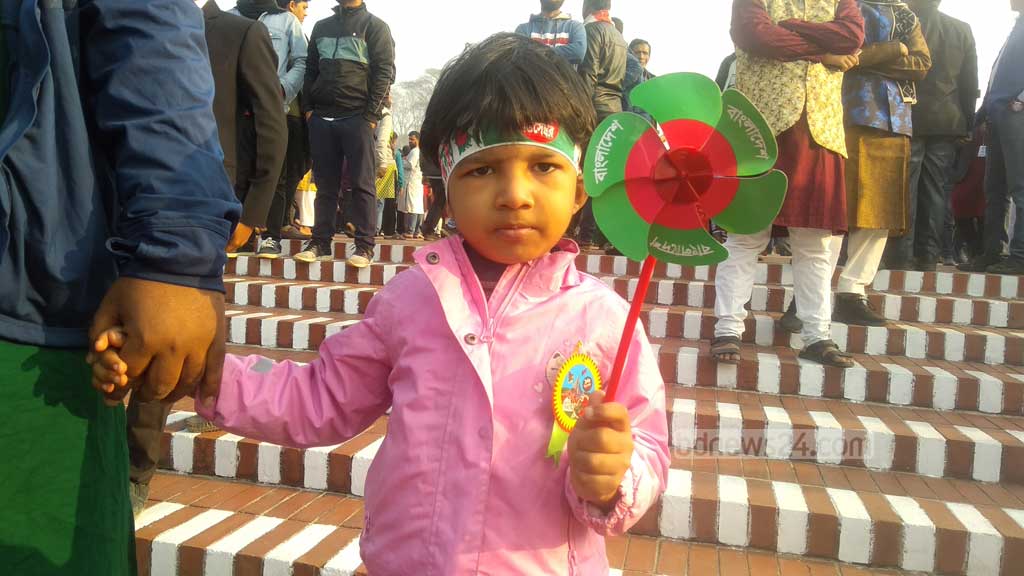Home
+
The president and the prime minister led the celebrations by placing wreaths as a mark of respect to the fallen heroes at the National Memorial in Savar

Published : 16 Dec 2023, 08:28 AM
Bangladesh is commemorating the 52nd year of its victory over Pakistan in a nine-month war with aspirations for economic prosperity and a renewed call for an accurate portrayal of the Liberation War's history.
On Saturday, a jubilant atmosphere of red and green hues enveloped the National Memorial in Savar. The pillars of the National Martyrs' Memorial stood tall, bathed in love, respect, and reverence from people of all ages and backgrounds.
Generations came together, with a boy tightly holding his father's hand and a girl cradled in her grandfather's arms, to pay tribute to the heroes who sacrificed their lives for the freedom of their nation. People with disabilities, lined in their wheelchairs, dotted the altar to honour the memory of the martyrs. The sound of beating drums and bugles playing patriotic tunes echoed across the premises.
As the 12th national elections loom, there was a prevailing sentiment among the crowd for politicians to embrace the spirit of the great Liberation War.
The Victory Day commemoration began at sunrise, with President Md Shahabuddin and Prime Minister Sheikh Hasina laying wreaths at the memorial's altar as a mark of tribute to martyred freedom fighters. A moment of solemn silence followed, accompanied by the mournful tune of a bugle.

Speaker Shirin Sharmin Chaudhury, Chief Justice Obaidul Hassan, cabinet ministers, Armed Forces chiefs, and foreign diplomats were in attendance. Families of the Bir Sreshtha and Indian army veterans who fought alongside Bangladeshis in 1971 also paid their respects.
As the memorial opened to the public, hundreds poured in with flowers in hand, many donning red and green headbands. Political organizations, including the BNP, Bangladesh Communist Party, and JASAD, paid tribute to the valiant freedom fighters.
Among the attendees, Muskan, a student from Nabinagar in Savar, expressed her respect for the martyrs. Her father, Abdul Ahad Molla, emphasised the importance of understanding history, conveying it to the younger generation, and inspiring patriotism.
"We've come here, but many of us don't know the actual history of the Liberation War. I brought my daughter here to show our love for the country. She asks me various questions about our independence struggle and I try to explain it to her as best I can."
Riding on her grandfather's lap, Munia Faraji has come to the memorial for the first time with a national flag in hand. Police officer Mohammad Kabir Hossain, Munia's grandfather, stressed the significance of passing down the ideals of sacrifice to future generations.
Dhaka University Vice-Chancellor ASM Masud Kamal emphasised the need to convey the correct history of the Liberation War to the younger generation to instill patriotism and contribute to the nation-building process.

Jagannath University Vice-Chancellor Professor Sadeka Halim acknowledged the impossibility of repaying freedom fighters' sacrifices but urged the commitment to uphold the ideals for which they fought.
As the British colonial rule ended in 1947, Bengalis were once again shackled, this time by West Pakistan.
But the people of then East Pakistan soon found a champion for their cause in Bangabandhu Sheikh Mujibur Rahman, who would go on to deliver on his promise to break the chains of West Pakistani oppression.
As the discontent simmered over two decades of West Pakistani rule, the Pakistan Army swooped down on unarmed, innocent Bengalis on the night of Mar 25, 1971 to crush their struggle for freedom.
But Bangabandhu, the undisputed leader of the Bengalis, had effectively announced the nation’s independence at the historic Mar 7 rally at the Race Course grounds, when he proclaimed in a thunderous voice: “This time the struggle is for our freedom. This time the struggle is for our independence.”

Bengalis put up a valiant resistance and snatched victory on Dec 16 after nine months of the Liberation War.
Lt Gen Amir Abdullah Khan Niyazi, the martial law administrator of then East Pakistan, signed the official document of surrender sitting next to Lt Gen Jagjit Singh Aurora, the joint commander of Indian forces and the Mukti Bahini of Bangladesh, at the Ramna Race Course ground, now Suhrawardy Udyan.
Now, after 52 years, Bangladesh has become the first country in South Asia to have a road tunnel under a river. It has also built a metro rail system in Dhaka and opened the Padma Bridge, among other projects in recent years.
Important buildings and establishments have been decorated and illuminated with lights to mark the occasion. The main thoroughfares of the city are bedecked with national flags and colourful festoons.
Higher quality meals will be served in prisons, hospitals and orphanages while special prayers will be offered in mosques, temples, pagodas and other places of worship for the departed souls and the country's peace, progress and prosperity.
Newspapers will publish special supplements marking the day, while televisions and radio stations will air special programmes.